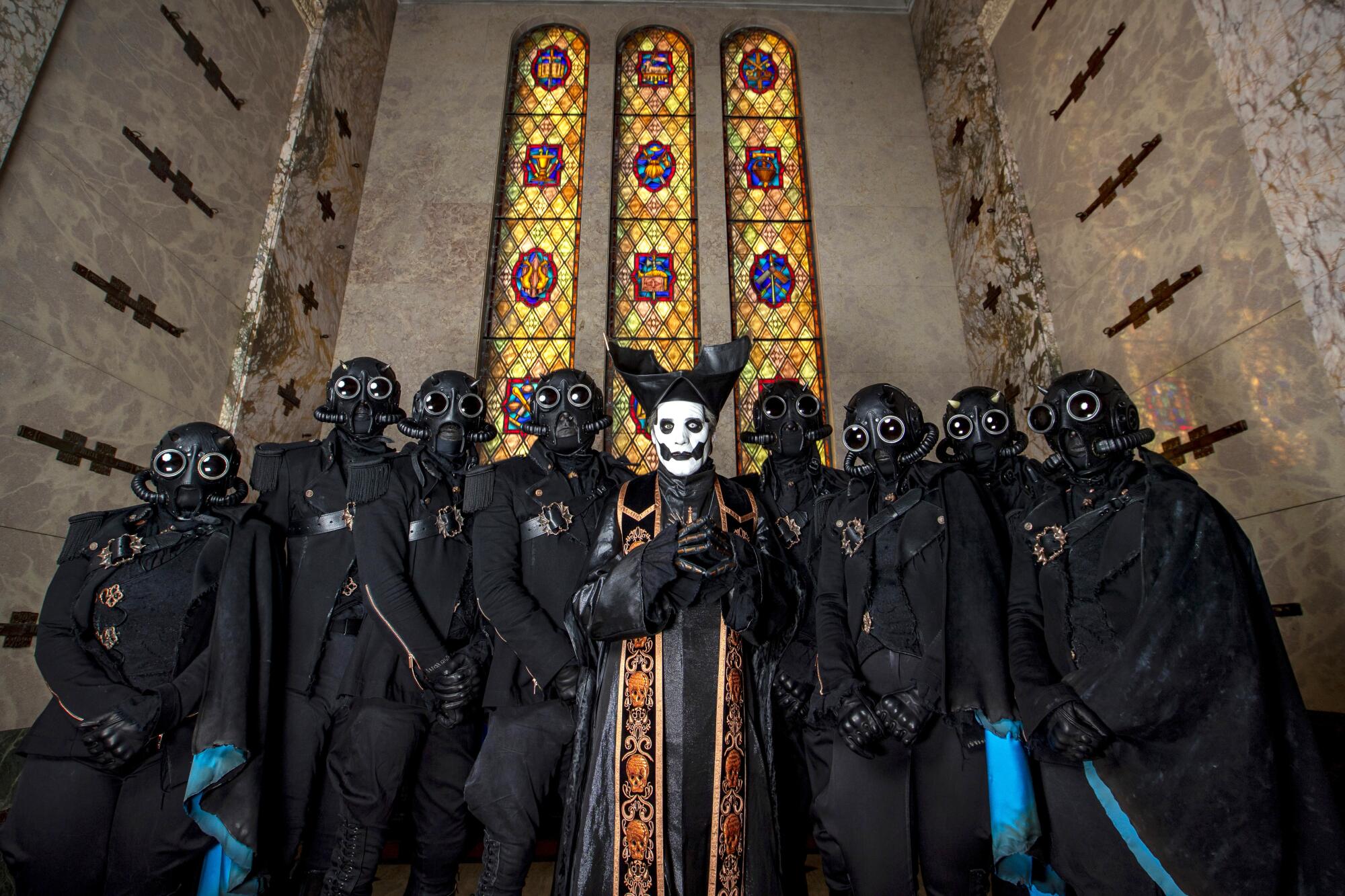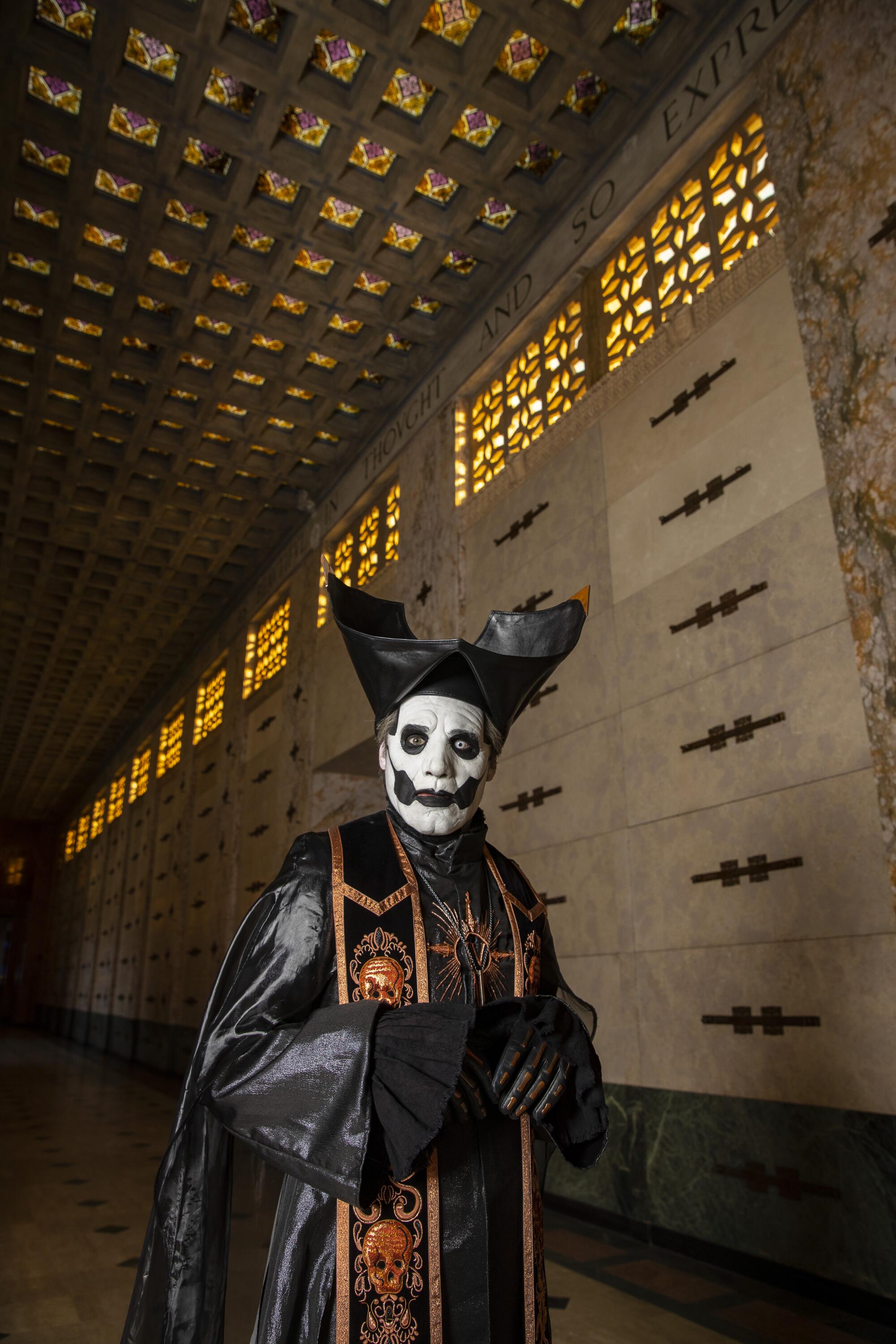
- Share via
Onstage at Anaheim’s Honda Center arena, Tobias Forge is not himself.
Instead, he is Papa Emeritus IV, leader of the theatrical Swedish metal band Ghost, singing from behind a latex mask and corpse paint, dressed in religious attire or bat wings.
His persona is of Ghost’s demonic pope, preaching of war and plague like a doom prophet amid heavy guitar riffs and vivid pop melodies. Some lyrics are more prescient than fantasy, from warning of “beliefs contagious, spreading disease” on the 2018 song “Rats” to the band’s new “Impera” album, which decries empire-building in time for Russia’s brutal invasion of Ukraine.
Forge says he’s merely an observer of history and “the circularity of things,” as destructive human impulses repeat themselves catastrophically across the centuries. “Flags, pandemics, flus and dictators come and go,” he says cheerfully. “Empires come and go. It’s always in circles, because at the end of the day we are dealing with humans.”
From a rambling compound in Sunland-Tujunga, Cathy Pellow runs the heavy-rock label Sargent House, a haven for experimental musicians, many of whom are women.
Forge, 41, is out of costume and sipping coffee at his West Hollywood hotel after a night of hard rock spectacle, with pyro eruptions and a big stage meant to convey threatening Gothic arches and stained glass. Offstage, Forge is less explosive, dressed in a treasured 1988 Candlemass tour T-shirt, his light auburn hair short and swept upward on top. He’s a thoughtful interview and quick with a joke, a family man with a wife and fraternal twins back in Stockholm. The previous night’s concert in Orange County was the final stop of a co-headlining arena tour with the Danish band Volbeat designed as a prelude to the March 11 release of the band’s fifth album, “Impera.”
During rehearsals ahead of the tour, Forge got “a very mild case” of the Omicron virus. Then the eight other touring members of the band tested positive, along with four crew members. “The whole band had it at the same time, so we just had COVID rehearsals,” he says. The tour happened as scheduled, and Ghost will be back in the U.S. later this year.

The band’s last record, 2018’s “Prequelle,” earned a Grammy nomination for rock album and hit No. 3 on Billboard’s Top 200. The band counts Metallica and Dave Grohl among its high-profile fans, and attracts a multigenerational rock audience, from kids in baby pope gear all the way up to older fanatics nostalgic for ’70s shock rock.
“Ghost has a diverse audience, which I love to see, especially for metal,” says Sammi Chichester, managing editor of Revolver Magazine, a close observer of the metal scene.
Forge is able to find pop hooks even as he mines his own low expectations for mankind. As a result of that catchiness, Ghost has been controversial among certain extreme-metal tastemakers. “It is a routine topic — metalheads love to argue,” says Chichester with a laugh.
The music tends to be more engaging than depressed, despite the ominous religious imagery.
“The lyrics are not about God. They’re about man,” says Forge. “We are, at the end of the day, an occult, pop, satanic sort of rock ’n’ roll band meant to entertain a group of people who are already down with that stuff.”
Any discussion with Forge quickly reveals him as a pop music obsessive, as he casually references Leonard Cohen, the Bangles and the primitive weirdness of the Shaggs. He’s not your typical high priest of metal. “In my adolescence, I was completely a death metal/black metal person in action and message,” he says. “But I always listened to a lot of other things. And that materialized in whatever music I was writing.”

Ghost was created in 2006 with Forge’s recording of a track called “Stand by Him,” built on a slippery metal riff and roots firmly planted in Scandinavian black metal. The music that followed rarely strayed from a growling metal core but showed surprising flourishes from the beginning, from busy keyboard melodies to delicate acoustic guitar.
The band arrived with a fully formed image that adopted a demonic, bizarro take on the Catholic tradition, accented with Gothic flair and comedy. Forge stood at the microphone in the role of a series of demonic popes called Papa Emeritus (Nos. I-IV), in flamboyant papal attire, with a band of musicians called Nameless Ghouls in silver masks. (The Ghouls now appear in what look like gas masks from a dystopian future.)
Forge, who is the band’s only consistent member, kept his identity hidden behind facepaint and pseudonym until he had to reveal his real name during an unsuccessful 2017 lawsuit by four ex-members of Ghost over back pay.
By now, it’s ubiquitous: the glow of cellphones held aloft at concerts. But artists like Mitski and Bruno Mars are asking fans to watch the show, not their phones.
“Impera” was recorded last spring and summer, after the original plan to work with an American producer in the U.S. was canceled as the coronavirus crisis dragged on. Instead, Forge reunited with Swedish producer Klas Åhlund (Ghost’s collaborator on 2015’s “Meliora”), and he took his time composing new songs.
He sketched out a melody for the album’s closer, a nearly seven-minute prog epic called “Respite on the Spitalfields,” on the small electric piano in his daughter’s bedroom. “Twenties” emerged as a frantic chronicle of greed and oppression, in the form of a “demagogue sect leader speaking down to his followers in utter contempt,” he says. The sneering, catchy ’80s rock of “Griftwood” was inspired by former Vice President Mike Pence and leaders who wield the Bible as a means to political power.
The album also arrives as a pair of successful TV series — “Cobra Kai” and “Peacemaker” — have reintroduced an earlier generation of pop-metal to the masses, with prominent use of ’80s hits by the likes of Twisted Sister, Faster Pussycat, Hanoi Rocks, Ratt, Mötley Crüe, Scorpions and Def Leppard.
Ghost isn’t a throwback to the hair-metal era but does share a taste for hooks and melodrama. Forge hasn’t seen “Peacemaker” but spent quality downtime at home in Sweden watching “Cobra Kai” with his teenage daughter. “That series is a slam-dunk,” he says of the show, which continues the story of the “Karate Kid” movies. “And the music is great.”
The Ghost mastermind admits to nostalgia for what was commonly known as “album-oriented rock,” the mainstream rock category epitomized by Journey, Foreigner, Boston and other ’70s and ’80s FM radio stars. “I’m a huge fan of AOR bands,” says Forge, describing the genre as “smart divorce rock played by older men with mustaches who have gone through a little bit in their lives.”

Forge was raised in Linköping, Sweden, by a single mother and indoctrinated into rock early, by a brother 13 years older. Before he was 10, Forge was buying English and German rock magazines he couldn’t read, and absorbing as much metal, punk and classic rock as he could.
As a teenager, his tastes grew even darker and more extreme, as he discovered underground metal rising from Europe and America — then turned away from anything new in the genre after 1994, when he sensed things becoming too polished, spoiling the scary lo-fi sound and image he loved.
As Ghost itself grows more sophisticated in its sound and approach, Forge knows some longtime fans wish he would return to the band’s original recipe. Forge understands the feeling, and admits that he’d love nothing more than to produce new albums from bands of his youth so that he could force them back to an earlier sound.
He says he wants to satisfy fans while also challenging them. “I deal with that professionally in one way, and as a fan in another.”
Forge fully appreciates the intense feelings a music fan can have about a recording artist. Evolution is not always welcome.
“That has a lot to do with the type of personalities that are drawn to the world that we’ve been talking about: metal, hardcore, comic books, sci-fi — it’s a retreat, a safe place of order, organization, knowledge. This is the world that you hide in after school. And now there’s someone coming in there trying to … evolve? It’s disruptive.
“It’s not right or wrong. The future is what we don’t know, as much as it hurts.”
More to Read
The biggest entertainment stories
Get our big stories about Hollywood, film, television, music, arts, culture and more right in your inbox as soon as they publish.
You may occasionally receive promotional content from the Los Angeles Times.












